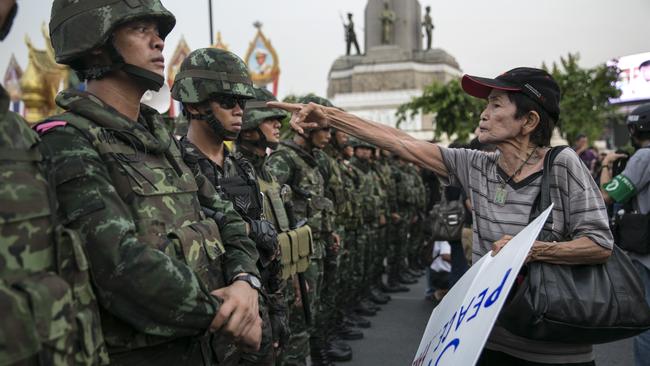Thai company’s 99% crash triggers alarm
The stock market of one of Australia’s closest neighbours is in trouble, with a huge tech company on the brink of collapse.

Business
Don't miss out on the headlines from Business. Followed categories will be added to My News.
The stock market of one of Australia’s closest neighbours is in trouble, with a huge tech company on the brink of collapse as its value plunges by more than 99 per cent.
Thailand-based tech manufacturer Stark Corp has lost a staggering 99 per cent of its market capitalisation in the past six months and defaulted on some of its 39 billion baht (A$1.7 billion) in liabilities.
The crash has been exponential — Stark shares plummeted by more than 30 per cent on Friday alone.

Just a year ago, the company looked to be a Thai success story. It was backed by a wealthy local businessman, valued at nearly A$3 billion and was making its first major acquisition outside Asia.
Now, as shockwaves surge through southeast Asia’s second largest economy, it’s looking unlikely that the decades-old manufacturing giant will survive.
Stark, which primarily makes electrical cables, has been embroiled in an accounting scandal that alleges it bolstered its financial statements with fake names and payments.
The company’s origins date back to 1990, when it was founded as a comics publisher and distributor called Siam Inter Multimedia. Its name was changed to Stark in 2019 about a year after Vonnarat Tangkaravakoon, a businessman from one of Thailand’s wealthiest families, acquired majority control of the company.
Tangkaravakoon transformed the media and publishing company into a manufacturer of electrical wires and components through the acquisition of a local cable making company, Phelps Dodge International.
Under his leadership, Stark made waves with a number of impressive acquisitions, leading up to the announcement of a €560 million deal to buy Germany-based Leoni Business Group Automotive Cable Solutions in May last year.

Accounting scandal
Stark backed away from the Leoni deal in December, sparking the first whispers of concern that the company was in trouble.
The whispers turned to screams on February, when Stark’s CEO suddenly resigned and the company declined to report its financial results.
Stark’s shares plunged by 92 per cent on June 1, their first day of trading after being suspended for more than two months. On June 16, Stark finally released its financial statements, revealing a net loss of 6.61 billion baht (A$260 million) for 2022 alone.
An analysis by PwC found “unusual sale transactions” worth 11.59 billion baht (A$500 million) over 2021 and 2022 including fake “payer names and payments on behalf of customers from accounts of the company’s former officers.”
Stark’s shares have plummeted to near-zero in the wake of the scandal, slashing its value from last year’s peak of A$2.6 billion to about A$16 million. On Friday, Stark shares were trading at just 0.02 baht (A$0.00085).

Financial woes after Thailand’s election
The crash comes at a particularly anxious time in Thailand’s financial sector, with investors spooked by the flow-on effects of last month’s general election.
A record 75 per cent of eligible voters turned up to the polls in what was the country’s second election since a military coup seized control of government in 2014.
The opposition Move Forward Party surprised analysts by romping home in a shock victory — but in Thailand, often referred to as one of the most corrupt countries in the world, 250 members of the Senate are unelected. Those members were appointed by the military junta and tend to be conservative, making it difficult for progressive parties to push for change.
Thailand’s benchmark equity index has fallen by around 10 per cent this year to levels last seen in 2021, while foreign investors have pulled more than A$4.4 billion from Thai stocks.
On Thursday, Thai finance minister Arkhom Termpittayapaisith met with regulators to ask for investigations into the Stark scandal. He also called for law enforcement agencies to bring charges against individuals who were found to have broken laws.
Stark, in the meantime, is under serious pressure. One of its lenders, Asia Plus Securities, has said it will pursue legal action if Stark fails to pay back 3.93 billion baht (A$167 million) that’s due in 2024.
Originally published as Thai company’s 99% crash triggers alarm




